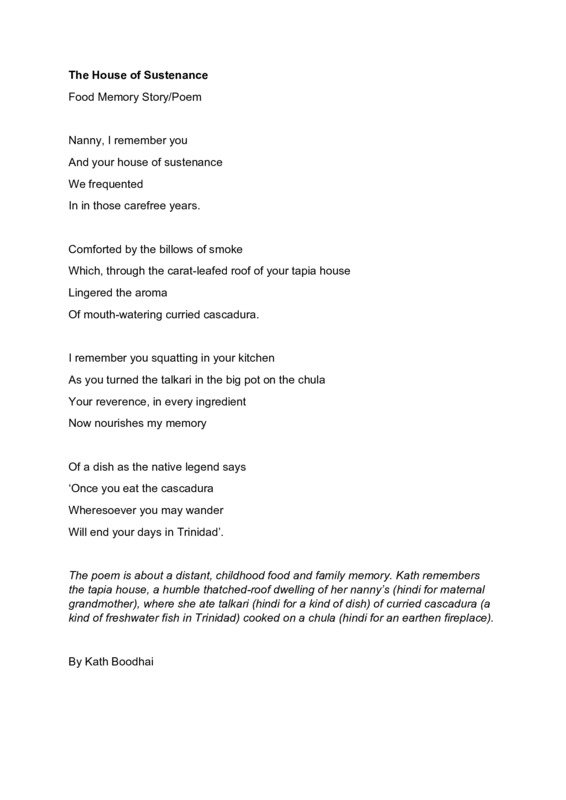| Title |
The House of Sustenance
|
| Description |
A 'black box memory poem'
This poem is about a conversation I could not have with my nanny (my now deceased maternal grand-mother in Trinidad. Nanny is a Bhojupuri Hindi word. Bhojpuri is a hybrid of Awadi Hindi from North-Eastern state of Uttar Pradesh, fro where my ancestors were Indentured under British Colonialism from 1845-1917).
It is increasingly being erased but now re-emerging in Trinidad. And this poem for want of a better phrase is a homage to say thank you to my nanny, for her labour, the labour of my ancestors for all enriching me by passing on her/their labour, food, language and so much more.
I remember visiting both my nanny and nana in the 80s and even though they did not have much, their small house had an abundant garden of infinite offerings.
This item was uploaded during the 'DIY Feminist Archival Practices for Researchers' (10th Feb. 2021) workshop, facilitated by Dr Sharon Webb and Dr Niamh Moore, for the AHRC-IRC funded network grant, Intersections, Feminism, Technology & Digital Humanities network (IFTe)
|
| Date Created |
27th November, 2017
|
| Contributor |
Kathleen Boodhai
|
| Rights |
CC BY-NC-ND
|
| Subject | |
| extracted text |
The House of Sustenance
Food Memory Story/Poem Nanny, I remember you And your house of sustenance We frequented In in those carefree years. Comforted by the billows of smoke Which, through the carat-leafed roof of your tapia house Lingered the aroma Of mouth-watering curried cascadura. I remember you squatting in your kitchen As you turned the talkari in the big pot on the chula Your reverence, in every ingredient Now nourishes my memory Of a dish as the native legend says ‘Once you eat the cascadura Wheresoever you may wander Will end your days in Trinidad’. The poem is about a distant, childhood food and family memory. Kath remembers the tapia house, a humble thatched-roof dwelling of her nanny’s (hindi for maternal grandmother), where she ate talkari (hindi for a kind of dish) of curried cascadura (a kind of freshwater fish in Trinidad) cooked on a chula (hindi for an earthen fireplace). By Kath Boodhai |
This item was submitted on February 10, 2021 by [anonymous user] using the form “Add your own material” on the site “Feminist Approaches to Youth Sexualities”: https://archives.reanimatingdata.co.uk/s/fays
Click here to view the collected data.